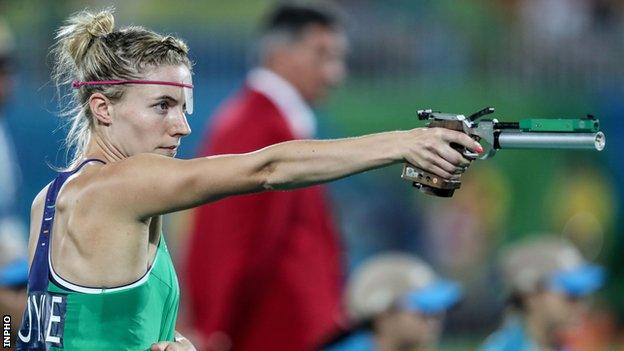Natalya Coyle: Olympics a beacon of hope in uncertain times for Irish pentathlete
- Published

Dubliner Natalya Coyle takes aim during the running and shooting round at the 2016 Rio Olympics
Irish modern pentathlete Natalya Coyle says having "that goal of Tokyo" is helping her stay motivated during the Covid-19 pandemic.
The Tokyo Olympics were postponed in March until next year as a result of the onset of the coronavirus crisis.
"When (the Olympics) were first postponed it was a massive relief for me because I was worried about not being able to prepare adequately," she told 大象传媒 Radio Ulster's Sportsound Extra Time.
"I've been to two Olympics and I'm not going to a third just to get the tracksuit. I want to win a medal. For me going ill prepared wasn't what I wanted to do. It was much better that it was postponed to allow people to prepare adequately."
Modern Pentathlon was created by the founder of the Modern Olympic Games, Baron Pierre de Coubertin, with the intention of creating the ideal athlete. The event comprises fencing, swimming, horse riding and combined running and shooting.
'Athletes love routines'
Coyle, who previously competed at the London 2012 and Rio 2016 Olympic Games, has had her routine turned upside down over the last six months and hopes to avoid further disruption to her training schedule.
"As a pentathlete I have five elements - during lockdown I couldn't fence and I couldn't swim."
Coyle is hopeful that elite athletes like herself can continue to train without restrictions in the weeks ahead in line with her competitors in Europe.
Natalya Coyle gets in some fencing practice during the Covid-19 lockdown earlier this year
"You get massive days of motivation and then huge days of demotivation because everyone's routine is very much out, and for me I would go away a lot on training camps and they're not happening.
"It is tough to stay motivated and keep that positivity going - everyone's got to have a day where they're down because it brings you back up again and you realise why you enjoy the sport.
'Absence makes the heart grow fonder'
"When I got back in the pool it was like I had never swam before. In my whole career I'd probably been out of the pool a maximum of three weeks, and we were out eight or nine weeks. I stopped counting towards the end!
"When we first got back (into the pool), it was really tough, you have to start off at such a small level so you don't get injured because your shoulders aren't used to it. It took a long time to get back up again.
"And in fencing we took it very slowly as well because it's a whole different range of movements with your hips and also massive explosivity with your legs.
"It was very strange, the pool especially, but it was really good as well because when you got back in, you were like 'aw I remember I love this!' - I never thought I'd be interested in getting back in the pool again."
Medal hopes
The 2019 Pentathlon World Cup silver medallist hopes to challenge for medals in Tokyo.
"It's been a progression across the course of my career. I came ninth in the London Olympics and then sixth in Rio, so I'm hoping at the rate of that progression Tokyo can be a good one for me!
Natalya Coyle guides her horse over a fence at the Rio Games four years ago
"Every Olympics that I go to I always say I want to get a personal best in each event and I've done that at both Games so far.
"In pentathlon there's so many different variables and you never know what's going to happen on the day. You never know on the start line who's going to win. I think if you focus on the individual elements that can really get you off to a positive start."
Click here to hear Natalya Coyle's full interview with Nikki Gregg on 大象传媒 Radio Ulster's Sportsound Extra Time.